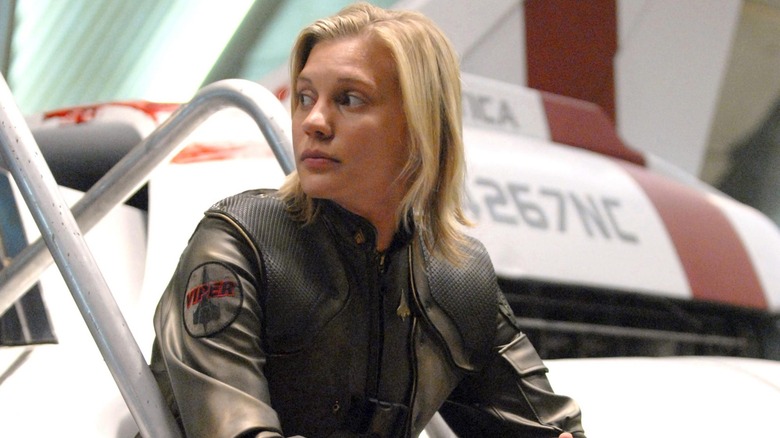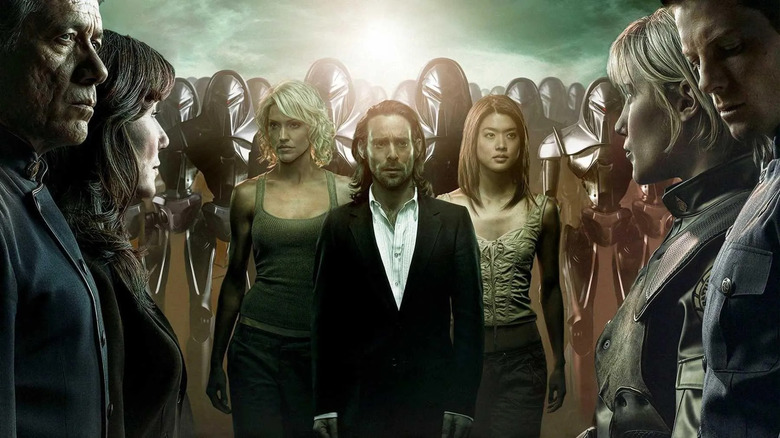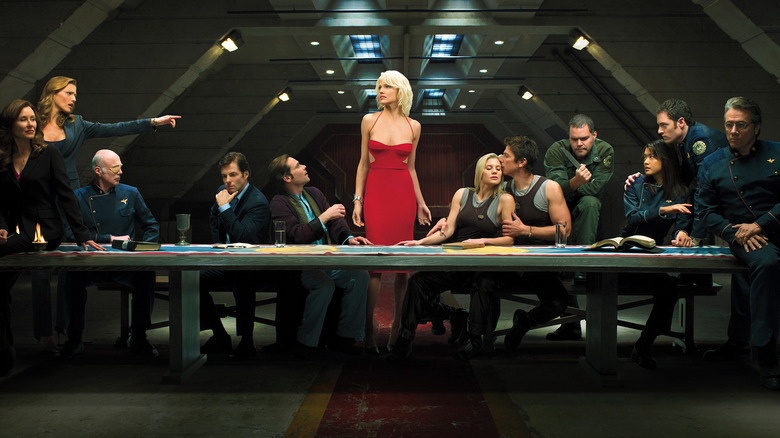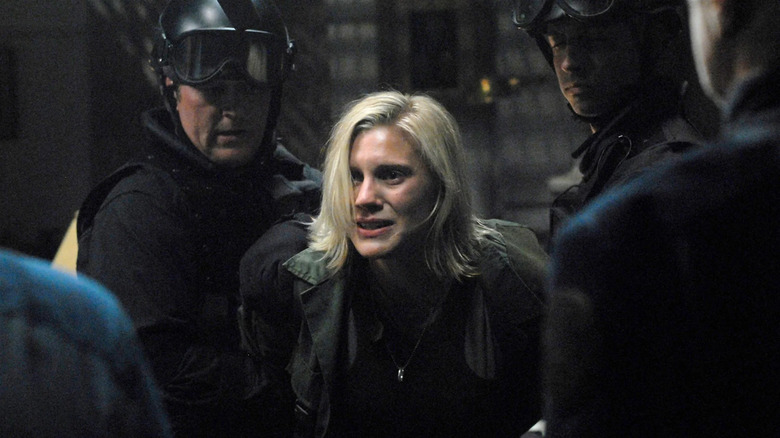Battlestar Galactica's Ending Took The Network By Surprise
"Battlestar Galactica" was an award-winning sci-fi series that began as a miniseries in 2003 before continuing in an acclaimed four season run. It was created by Ronald D. Moore as a reimagining of the 1978 series of the same name, updating the basic concept for the modern age.
That basic concept? The human race is nearly wiped out by the Cylons, robots of their own creation, and must go on the run as refugees in space, working to project the remnants of their civilization on a ragtag fleet of ships. If you have yet to watch it, you must. It's not only a great show, but it's scarier now that we as a society are closer than ever to handing the keys to our world over to full-on artificial intelligence.
The series was such a hit with fans — some of us added the series' use of the word "frak" into our daily lexicon — that it was a bit of a shock that the series ended with the fourth season. But it was also shocking how it ended.
Why the show ended so early
Nowadays, TV fans aren't completely shocked when a show creator decides to end a story. Fans may have been sad to see, say, "The Good Place" end its run at four seasons, but it wasn't surprising. Michael Schur wanted to give the story a beginning, middle, and ending. He didn't want it to run on and on, throwing obstacles in paths just for the sake of it. Ronald D. Moore felt the same about the journey of the Twelve Colonies who were trying to find a new place to live.
Moore has since moved on to "Outlander," and there are "Battlestar Galactica" projects in the works without him. Still, sci-fi fans will always remember what he gave us with the 2003 miniseries and the four seasons of "Battlestar."
Notably, the show wasn't canceled by SYFY (known then as The Sci-Fi Channel). Moore chose to end it by choice. In an interview with Empire Online, Moore said that the network was "kind of surprised" by the move. He came to them around the end of the third season and said:
'I want next year to be the last one. We've reached the third act of the story. I don't want to stretch it beyond the point where it would be good television, let's go out strong.' They were a little surprised, they hesitated, we talked about it a little bit and they agreed and that was the decision we made. If this is a different kind of show, we'd have a different kind of conversation. If this was a Law & Order or a procedural or an episodic series like the original Star Trek, I think you'd have a different set of parameters to deal with and different considerations. There's no reason for those kinds of shows to really end – you can swap cast members and keep the journey going.
'It was my choice to end the show'
That's a bold move, and one that served the story well. Despite the fact that fans were split on the finale — and we'll get to that — continuing to throw more and more obstacles in the paths of the colonists would have served no purpose. Of course we wanted to see more as fans, but sometimes it's okay to be left wanting.
Moore said in the interview that there had been a plan for the story, and that the surviving characters were either going to find a place to live or they were not. He said:
"There comes a point with the audience where they either believe you or they stop believing you, and I didn't want to reach a point where they don't believe you. You don't want it to become Gilligan's Island; you don't want to get to the point where the audience tunes in and says, 'Yeah, they're never going to get to f***ing Earth. None of the main cast members are going to die, it's just going to go on forever.' Then the audience grows cynical and they don't pay attention anymore. I didn't want to get to that point. It felt like the show had honored us and it was time to honor the story and bring it to a conclusion."
Shows have suffered from the endless search for the same thing, or the same obstacle. I will humbly throw out the idea that, if there is never a way to actually conquer the undead threat in "The Walking Dead" and all its spinoffs, it just becomes misery porn.
I like what Moore says about honoring the story. Any show can go on endlessly if you have enough viewers. It's a hard decision to end things when you have a cast and crew whose livelihoods you are responsible for, and fans who want more. Ultimately though, what you are doing is telling a story, and if the story you've created or adapted has a natural stopping point, continuing is going to take away from its power in the end. Those same fans who loved it are likely going to turn on you, and all that love and the message you wanted to send will sour.
So say we all
Was the ending good though? When I first watched, I hated it. I thought it was convoluted and weird, and it felt like an easy out. There are spoilers ahead. You've been warned.
In season 4, the refugees find a planet to settle on; Earth from way back in our ancient history. The more advanced humans interbreed with the residents who are early in their journey, and after 150,000 years, society develops into our own, and two Cylons discuss how this has all happened before and that it will happen again.
That wasn't really the thing that bothered fans, however. Late in season 3, Starbuck has a vision where she's told to fulfill her destiny. Her Viper explodes, leaving us all to think she's been killed off. Then she returns in a later episode saying she's found Earth and that she's going to lead everyone to a new home. Since the series spent a whole lot of time discovering Cylons hiding among the humans, the rest of the series saw people (characters and fans alike) questioning whether or not she's human.
After bringing the group to Earth, she disappears after saying this was all part of God's plan. That's an oversimplification, but the big issue here was the use of religion and religious imagery. It's not that the series hadn't spoke about religion throughout — the faith versus science debate was a core theme — but this development feels like it comes out of nowhere. Here we have a character who was fully human and flawed, who was then portrayed as an angel who was resurrected to lead people to Earth. Was she always one? Was she a collective vision? Does saying that God was behind it take away from the dramatic impact? Whatever the reason, it was never fully explained. Many fans felt like adding this as a plot point was a sharp turn from the rest of the series. That said, we're getting more projects in the "BSG" universe. We'll see if they go the way of science, the way of religion, or a combination of both.
"Battlestar Galactica" ended when it should have ended. It ended when it needed to end. So say we all. As to whether or not it ended how it should have ended, well, that's up to you.



